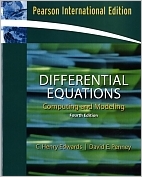net price + 5% vat.
This text provides the conceptual development and geometric visualization
of a modern differential equations course that is still essential to science and
engineering students.
It reflects the new emphases that permeate the learning of elementary
differential equations, including the wide availability of scientific computing
environments like Maple, Mathematica, and MATLAB; its focus has shifted from the
traditional manual methods to new computer-based methods that illuminate qualitative
phenomena and make accessible a wider range of more realistic applications. Seldom-used
topics have been trimmed and new topics added: it starts and ends with discussions of
mathematical modeling of real-world phenomena, evident in figures, examples, problems, and
applications throughout the text.
Table of Contents
1. First Order Differential Equations.
Differential Equations and Mathematical Models. Integrals as General and Particular
Solutions. Slope Fields and Solution Curves. Separable Equations and Applications. Linear
First Order Equations. Substitution Methods and Exact Equations.
2. Mathematical Models and Numerical Methods.
Population Models. Equilibrium Solutions and Stability. Acceleration-Velocity Models.
Numerical Approximation: Euler's Method. A Closer Look at the Euler Method, and
Improvements. The Runge-Kutta Method.
3. Linear Equations of Higher Order.
Introduction: Second-Order Linear Equations. General Solutions of Linear Equations.
Homogeneous Equations with Constant Coefficients. Mechanical Vibrations. Nonhomogeneous
Equations and Undetermined Coefficients. Forced Oscillations and Resonance. Electrical
Circuits. Endpoint Problems and Eigenvalues.
4. Introduction to Systems of Differential Equations.
First-Order Systems and Applications. The Method of Elimination. Numerical Methods for
Systems.
5. Linear Systems of Differential Equations.
Linear Systems and Matrices. The Eigenvalue Method for Homogeneous Systems. Second Order
Systems and Mechanical Applications. Multiple Eigenvalue Solutions. Matrix Exponentials
and Linear Systems. Nonhomogeneous Linear Systems.
6. Nonlinear Systems and Phenomena.
Stability and the Phase Plane. Linear and Almost Linear Systems. Ecological Models:
Predators and Competitors. Nonlinear Mechanical Systems. Chaos in Dynamical Systems.
7. Laplace Transform Methods.
Laplace Transforms and Inverse Transforms. Transformation of Initial Value Problems.
Translation and Partial Fractions. Derivatives, Integrals, and Products of Transforms.
Periodic and Piecewise Continuous Forcing Functions. Impulses and Delta Functions.
600 pages, Paperback


